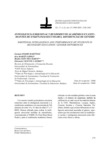Inteligencia emocional y rendimiento académico en estudiantes de enseñanza secundaria. Diferencias de género

View/
Use this link to cite
http://hdl.handle.net/2183/7623Collections
Metadata
Show full item recordTitle
Inteligencia emocional y rendimiento académico en estudiantes de enseñanza secundaria. Diferencias de géneroDate
2009Citation
Revista galego-portuguesa de psicoloxía e educación, 2009, 17: 275-284. ISSN: 1138-1663
Abstract
[Resumen] Con nuestro estudio pretendemos encontrar
relaciones entre la inteligencia emocional y el
rendimiento académico con una muestra de 344
alumnos de entre 14 y 16 años de edad (1º y 2º
ESO). Hemos utilizado para evaluar la inteli-
gencia emocional medidas de autoinforme,
concretamente el TMMS-24 (Trait Meta Mood
Scale) y para el rendimiento académico hemos
utilizado no sólo medidas globales como la nota
media y el número de suspensos, también la
calificación en cada una de las materias básicas
de la ESO: Matemáticas, Lengua, Inglés,
Ciencias Sociales y Ciencias Naturales. Por
último, debido a que existen diferencias en inte-
ligencia emocional asociadas al género, supo-
nemos que las correlaciones entre el rendimien-
to escolar e inteligencia emocional serán dife-
rentes entre chicos y chicas. [Abstract] Our study aims to find relationships bet-
ween emotional intelligence and academic
performance with a sample of 344 students
between 14 and 16 years of age (1st and 2nd
ESO). We used self-report measures to assess
emotional intelligence, namely TMMS-24
(Trait Meta Mood Scale) and for the academic
performance measures we have used not only
the global average and the number of failures,
but the grades in each of the core subjects of
the ESO: Mathematics, Language, English,
Social Sciences and Natural Sciences. Finally,
due to differences in emotional intelligence
related to gender, we assume that the correla-
tions between school performance and emo-
tional intelligence are different between boys
and girls.
Keywords
Inteligencia emocional
Rendimiento académico
Género
Emotional intelligence
Academic performance
Gender
Rendimiento académico
Género
Emotional intelligence
Academic performance
Gender
ISSN
1138-1663





